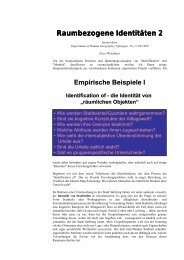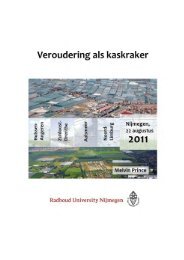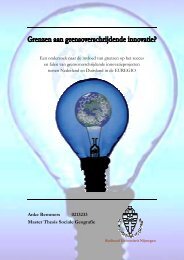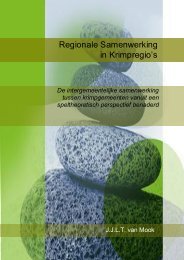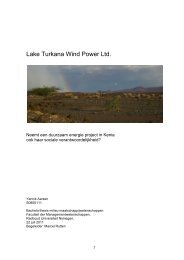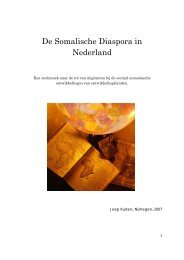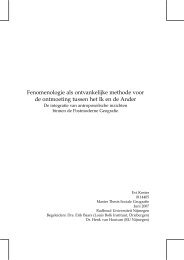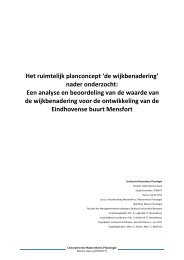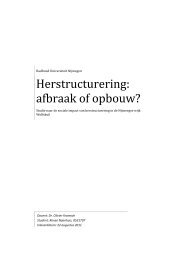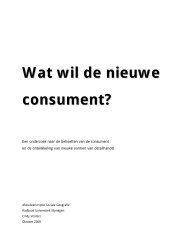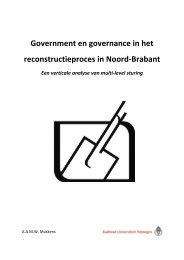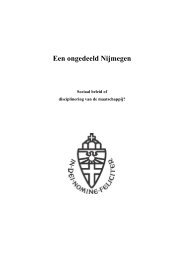Trading with the enemy in Mitrovica, Kosovo. - RUhosting
Trading with the enemy in Mitrovica, Kosovo. - RUhosting
Trading with the enemy in Mitrovica, Kosovo. - RUhosting
You also want an ePaper? Increase the reach of your titles
YUMPU automatically turns print PDFs into web optimized ePapers that Google loves.
unsafe for Albanians to go <strong>in</strong>to <strong>Mitrovica</strong> north I was told on several occasions that <strong>the</strong> Albanian<br />
construction workers are completely safe <strong>the</strong>re. The Serbian majority is dependent on <strong>the</strong>m for cheap and<br />
skilled labour. The same goes for trade, <strong>with</strong><strong>in</strong> trade contact is completely safe: <strong>the</strong>y need each o<strong>the</strong>r for <strong>the</strong>ir<br />
jobs. This is <strong>in</strong>terdependence.<br />
Some authors have argued that it is hard to determ<strong>in</strong>e causality regard<strong>in</strong>g <strong>the</strong> trade part of <strong>the</strong> Kantian peace<br />
<strong>the</strong>ory. Do states have good relations because <strong>the</strong>y engage <strong>in</strong> trade or do <strong>the</strong>y engage <strong>in</strong> trade because <strong>the</strong>y<br />
have or pursue good relations? While <strong>the</strong>ir argument stands, <strong>the</strong> <strong>Kosovo</strong>-Serbia relation is a quite <strong>in</strong>terest<strong>in</strong>g<br />
case <strong>in</strong> this. Keshk, Poll<strong>in</strong>s & Reuveny (2004) argument that levels of trade are only high between states<br />
because those states have good relations does not fly for <strong>the</strong> relations between Serbia and <strong>Kosovo</strong>. The<br />
relations between <strong>the</strong> government <strong>in</strong> Belgrade and <strong>the</strong> government <strong>in</strong> Prist<strong>in</strong>a are bad, to put it mildly. Serbia<br />
is even actively promot<strong>in</strong>g bad relations <strong>with</strong> <strong>the</strong> government <strong>in</strong> Prist<strong>in</strong>a, ma<strong>in</strong>ly aimed at deny<strong>in</strong>g its (legal)<br />
existence. The trade flows between <strong>the</strong> two territories are huge though, and based on <strong>the</strong>se Serbia can be<br />
considered to be <strong>Kosovo</strong>'s largest trad<strong>in</strong>g partner. So despite <strong>the</strong> efforts of both governments not to engage <strong>in</strong><br />
any k<strong>in</strong>d of relations, on <strong>the</strong> ground this situation is completely different. People engage <strong>in</strong> trade contact on a<br />
large scale. It is unclear to what extend this is <strong>in</strong>ter-ethnic contact because many Albanians are liv<strong>in</strong>g <strong>in</strong><br />
Serbia proper and many Serbs are liv<strong>in</strong>g <strong>in</strong> <strong>Kosovo</strong>, but this is irrelevant for my argument here. The po<strong>in</strong>t I'm<br />
try<strong>in</strong>g to make is that on a state level <strong>the</strong> Kantian peace <strong>the</strong>ory does not apply at all on <strong>the</strong> relationship<br />
between <strong>Kosovo</strong> and Serbia, no matter which direction of causality is considered. This is ano<strong>the</strong>r argument<br />
for my case that <strong>the</strong> Kantian peace <strong>the</strong>ory needs to be expanded to <strong>the</strong> micro level <strong>in</strong>stead of merely<br />
focuss<strong>in</strong>g on <strong>the</strong> macro level. While on a macro level <strong>the</strong> situation is opposite of what <strong>the</strong> trade aspect of <strong>the</strong><br />
Kantian peace <strong>the</strong>ory predicts (terrible <strong>in</strong>ter-state relations comb<strong>in</strong>ed <strong>with</strong> very high levels of trade) on a<br />
micro level <strong>the</strong>re seem to be plenty of <strong>in</strong>dicators that <strong>the</strong> same <strong>the</strong>ory does apply, which was demonstrated <strong>in</strong><br />
<strong>the</strong> results section. Of course, <strong>the</strong> <strong>in</strong>ter-ethnic relations on <strong>the</strong> ground are almost as bad as <strong>the</strong> <strong>in</strong>ter-state<br />
relations but traders are <strong>the</strong> exception here as <strong>the</strong>y seem to be operat<strong>in</strong>g under peaceful conditions, while<br />
trust<strong>in</strong>g <strong>the</strong>ir colleagues of <strong>the</strong> o<strong>the</strong>r ethnic group <strong>in</strong> <strong>the</strong>ir bus<strong>in</strong>ess. In short, what is happen<strong>in</strong>g on a state or<br />
macro level is very different from what is happen<strong>in</strong>g on an <strong>in</strong>dividual or micro level, especially <strong>in</strong> <strong>Mitrovica</strong>.<br />
This is an area where <strong>the</strong> Kantian peace <strong>the</strong>ory can be expanded because not only does this lower layer<br />
provide extra <strong>in</strong>formation, it can also provide completely new applications for this <strong>the</strong>ory such as <strong>in</strong>ter-ethnic<br />
trust build<strong>in</strong>g, for example.<br />
So far <strong>the</strong> purely economic argument. Dur<strong>in</strong>g <strong>the</strong> <strong>the</strong>oretical framework it has been discussed how Blanton<br />
(2006) argues that trade is more than just trade flows. His argument was targeted at <strong>the</strong> Kantian peace <strong>the</strong>ory<br />
and <strong>the</strong>refore he was referr<strong>in</strong>g to states, which is why it not entirely applicable to this <strong>the</strong>sis and research.<br />
But out of his four po<strong>in</strong>ts three can be directly related to <strong>in</strong>ter-ethnic trade as well: First, <strong>in</strong>ter-ethnic trade<br />
also encourages <strong>the</strong> trad<strong>in</strong>g and shar<strong>in</strong>g of <strong>in</strong>formation as well as transparency between parties. This can be<br />
seen by <strong>the</strong> example of traders call<strong>in</strong>g and check<strong>in</strong>g up on each o<strong>the</strong>r, even dur<strong>in</strong>g <strong>the</strong> crisis <strong>with</strong> <strong>the</strong> riots of<br />
81



